KATHMANDU: As the second week of January unfolds, the markets in Kathmandu’s historic town of Tokha, nestled in the northern part of Kathmandu, are bustling with activity.
The air is charged with anticipation as locals prepare for the upcoming Maghe Sankranti, a festival, setting their sights on the production of fragrant molasses specialty.
In the first week of January, particularly with the approach of Maghe Sankranti, Tokha entrepreneurs find themselves immersed in the craft of molasses-making.
The demand for molasses surges during the winter season, and this year sees a notable increase compared to previous ones.
The market is abuzz with activity, leaving little room for casual conversations.
Tokha, intricately tied to the art of molasses, derives its name from the Nepali words “Tu” meaning sugarcane and “Khwa” meaning field.
Locals believe that ‘Tukhhwa,’ corrupted over time, led to the formation of ‘Tokha.’
Sugarcane stands as the primary raw material for molasses production, with additional ingredients like milk, food, and spices playing essential roles.
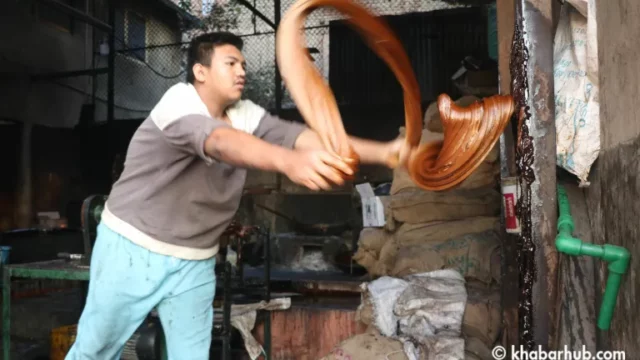
Maghe Sankranti, known as ‘Ghyachaku Sanlhu’ in Newari, is celebrated on the 1st of the Nepali month Magh (mid-January) each year.
Ghee and Chaku, two significant dishes, take center stage during this festival.
Consuming Chaku in the cold weather is believed to warm the body and boost immunity, making it a popular choice for Maghe Sankranti festivities.
As Tokha gears up for the celebration, the molasses-filled markets and the rhythmic clinking of molasses being crafted reflect the vibrant spirit of the season.
Tokha: A Molasses Hub
The residents of Tokha, engaged in an annual molasses trade worth approximately Rs 40 million, operate both within the country and abroad.
Sourcing their bounty from sugarcane-rich districts like Kapilvastu, Nawalparasi, and other Terai regions, the community has become a significant player in the molasses market.
Krishna Bahadur Shrestha, hailing from Tokha and serving as the President of the Molasses Conservation Society, provides insights into the diverse world of Tokha molasses.
“Plain molasses, packaged in 250-gram and 500-gram packets, find special use in rituals like Swasthani Puja and Satyanarayan Puja. Pilgrims heading to Gosaikunda also prefer these molasses,” shares Shrestha.
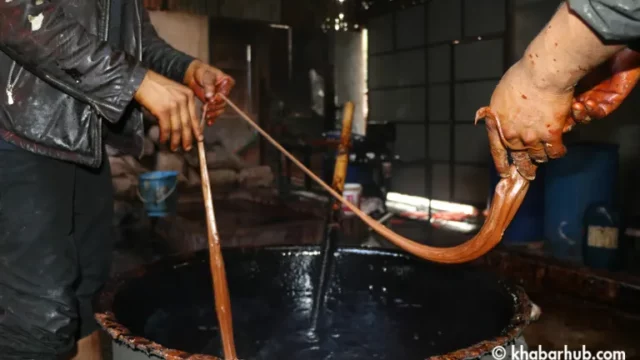
Highlighting the range of molasses prepared in Tokha, Shrestha mentions the distinct Masala molasses, designed primarily for consumption and body warmth rather than worship.
Additionally, ‘Bhuja laddu’ and ‘jhol chaku’, created with the elderly in mind, serve as versatile accompaniments for roti, bread, and more.
Innovating in the Molasses Market
Shrestha further reveals the Society’s innovation with new products like delivery molasses, incorporating cashew nuts and coconut.
Gudpak molasses, infused with food and hot spices, adds a unique flavor profile to the mix.
The ‘Khuwa Chaku’ boasts 75 percent food and ‘garam masala’ content, catering to culinary enthusiasts.
Sesame ‘laddus’ and almond ‘laddus’ add another layer of variety to Tokha’s molasses offerings, according to Shrestha.
Generations in Molasses: A Family Legacy
Buddha Shrestha, the Vice President of the Tokha Molasses Conservation Society and owner of Kashilal Chaku Production Pvt Ltd, proudly declares his four-decade-long involvement in the molasses industry.
“I am the fourth generation, and my children, now the fifth generation, are actively contributing to our legacy,” he states.
Reflecting on the evolution of molasses production in Tokha, Shrestha shares, “Initially, my father worked solo in molasses-making. Later, my two brothers and I joined in. Recently, we established a company to streamline our operations. With around 40 to 50 employees, we are dedicated to both molasses production and various ventures beyond.”
Tokha’s Commitment to Quality: A Global Expansion
Expressing a commitment to uphold stringent quality standards, Shrestha revealed the ambitious plan to extend market reach beyond Tokha and Nepal, venturing into the global arena.
Talking to Khabarhub, Shrestha shared his recent visit to the Terai region, emphasizing the importance of overseeing ‘sakhar’ production and ensuring high-quality standards.
Highlighting the global demand for Tokha-made molasses, he dispelled the notion that these molasses are exclusively consumed by the Newari caste, stating, “After the arrival of Maghe Sankranti, people from all 77 districts of Nepal have embraced the tradition of consuming these molasses.”
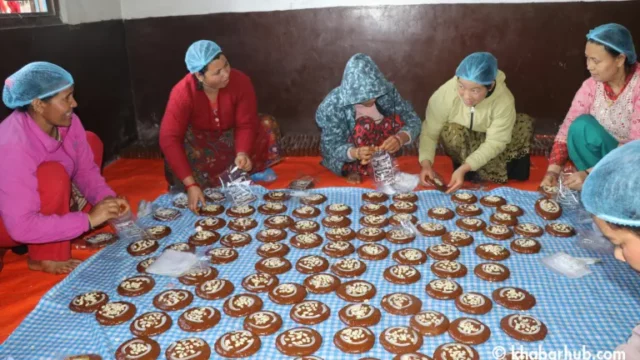
Vice President Shrestha acknowledged the seasonality of the business, primarily operating in winter, but emphasized the continuous improvement in quality.
He noted the shift from drying molasses on the floor to using tables, adhering to strict quality standards that prohibit drying in areas accessible to people.
Shrestha asserted, “Customers come to our location for pick-ups, ensuring no disappointments in our service.”
Discussing the pivotal role of the Association, Shrestha outlined ongoing efforts by the President to enhance both the quality of molasses and market growth.
He affirmed collaborative initiatives with the municipality, state government, and quality departments to elevate the reputation of Tokha’s molasses on the global stage.
Preserving a Culinary Heritage
Drawing on historical knowledge, Kumar Ranjit, an expert in Tokha’s molasses industry, highlighted the significance of molasses-making from sugarcane juice, recognized as one of the 18 different arts in the ‘Sushruta Samhita’ of Sanskrit.
He underscored the rich culinary heritage associated with molasses, asserting that in India, it has evolved into a prioritized industry.
Reflecting on Tokha’s ancient tradition of crafting molasses through a sharpening process, Kumar Ranjit remarked, “The art of making molasses in this ancient city of Tokha is a testament to human history, underscoring its enduring cultural and artisanal importance.”
Preserving Tokha’s Ancient Art
Continuing his discourse, he emphasizes, “This ancient art is diligently preserved by the Tokha Traditional Molasses Conservation Society, and it is imperative for the government to consider safeguarding it as a national heritage.”
Kumar further elaborates, drawing a parallel with Lalitpur being renowned as the city of fine arts.
He advocates for the society to advocate and assert the demand that Tokha be recognized and protected as a Molasses Art City, based on its ancient authenticity. He urges the government to acknowledge and support this cause.
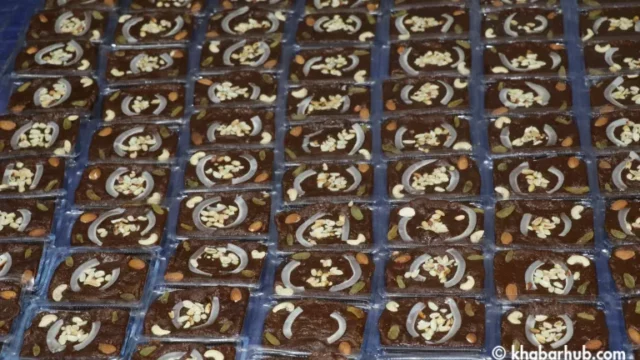
Highlighting the remarkable continuity of the art, Ranjith notes, “The fifth generation of molasses entrepreneurs is currently crafting molasses, a truly wonderful feat that we must ensure is preserved.”
Stressing the historical depth of molasses making in Tokha, he appeals to the government, asserting, “It is vital for everyone to recognize and appreciate that this art holds a significant place in our cultural history and deserves special protection.”


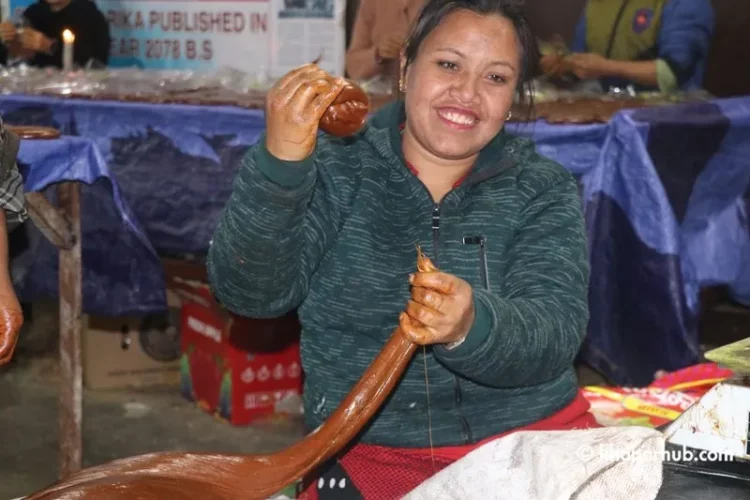






Comment